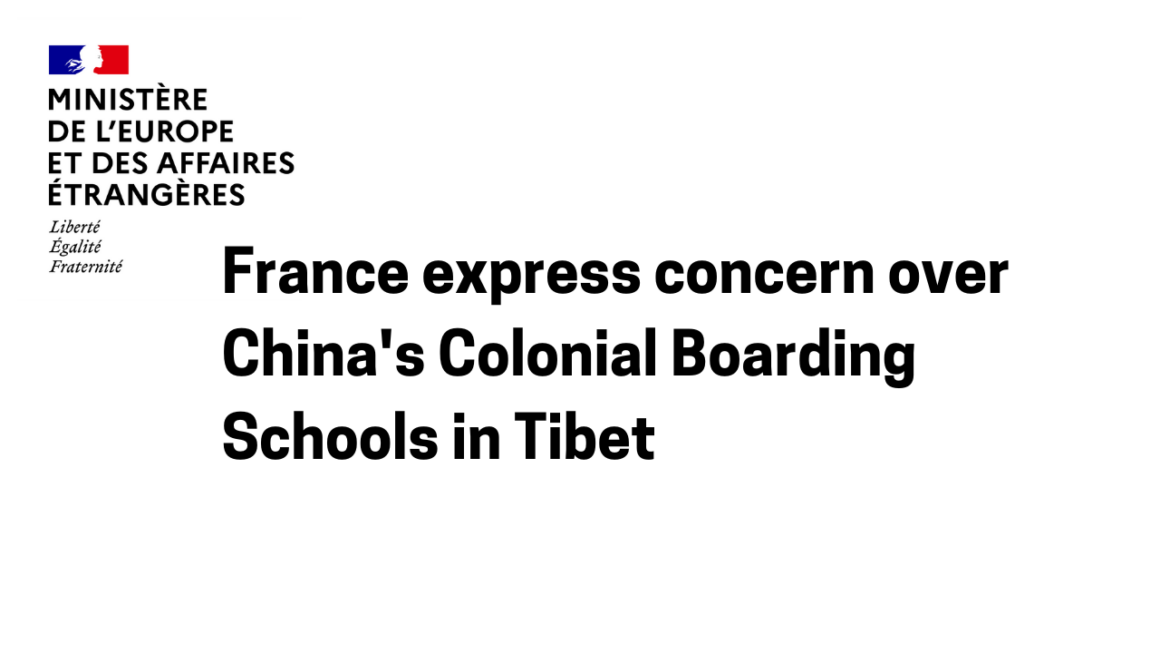France Express Concerns Over China’s Colonial Boarding Schools in Tibet
Question from Ms EUSTACHE-BRINIO Jacqueline (Val-d’Oise – Les Républicains) published on 03/23/2023
Original article: https://www.senat.fr/questions/base/2023/qSEQ230305886.html
Ms. Jacqueline Eustache-Brinio draws the attention of the Minister for Europe and Foreign Affairs to the forced boarding school of Tibetan children by China, which the United Nations (UN) recently seized. UN experts are indeed alarmed by the forced separation of a million Tibetan children from their families and their forced assimilation into boarding schools by China.
The Chinese policy to suppress Tibetan culture has intensified in recent years, notably with restrictive controls on any mention of Tibetan culture in the press, the suppression of Tibetan, Mongolian and Uyghur departments in universities, the ban on Tibetan families to welcome pilgrims from other regions as the Tibetan tradition teaches. With regard to education, a new policy has imposed since 2016, pre-schooling for children aged 4 to 8, exclusively in Chinese, compulsory and in boarding schools. These young children are thus cut off from their families during the week and, in the vast majority of cases, for several months for the nomads. This system would affect 150,000 Tibetans, and at this rate, in 15 years, it is estimated that 70% of Tibetans would no longer be able to express themselves in their native language.
The observation is general: after a few months, Tibetan children distance themselves from their parents, speak to each other in Chinese and behave like foreigners at home. A first consequence can be seen in the fall in the birth rate of Tibetans.
Unfortunately, parents, teachers and the Tibetan government in exile have difficulty resisting this forced sinicization of the new generation of Tibetans. Teachers cannot opt out of this mandatory system because they would lose their jobs. The parents try to fight by trying to preserve a Tibetan environment in the hearths (clothing, music, language) at the time of the rare returns of their children. The government in exile in Dharamsala, with its meager means, continues to promote education and the Tibetan language within the Tibetan communities in exile.
She asks him what steps the Government intends to take to denounce and combat this process, contrary to human rights, of forced Sinicization of young Tibetans which leads to a programmed eradication of Tibetan culture.
Response from the Ministry for Europe and Foreign Affairs published on 05/11/2023
Answer given in public session on 05/10/2023
France is deeply concerned by reports from various civil society organizations, researchers and Tibetan institutions that a system of preschool boarding schools for young Tibetan children threatens the transmission of culture , the Tibetan language and religion to the new generations, and which would contravene the fundamental rights of the child as recognized by the International Convention on the Rights of the Child (CIDE), among which the right to live in family, ratified by China in 1992. France closely follows the human rights situation in China and more particularly in the regions characterized by their ethnic diversity, such as the autonomous region of Tibet (TAR) and the other provinces where Tibetan people. Respect for fundamental rights is undergoing a very worrying development. France also deplores the tightening of the conditions for access to the TAR and to the Tibetan populations, which hinder the ability to observe the proper implementation by China of its commitments. As part of the close, demanding and constant dialogue it maintains with China, France systematically raises the human rights situation during its bilateral meetings, up to the highest level, urging the Chinese authorities to respect international human rights law, in particular the CRC. France also raises its concerns publicly in international bodies relating to human rights in China, such as the Human Rights Council or the 3rd Committee of the United Nations General Assembly. At the European level, on the occasion of the 38th session of the EU-China human rights dialogue, on February 17, 2023, the European Union (EU) repeatedly raised the human rights situation in Tibet, as well as the repression suffered by human rights defenders there. Finally, France supports the ongoing work on the duty of vigilance of companies and the fight against forced labor, which aim to make the commercial power of the EU a lever for improving the human rights situation. around the world, especially in China. More broadly, France calls for the resumption of dialogue between the Dalai Lama’s envoys and the Chinese authorities, in order to find a lasting solution that respects Tibetan culture and language.




Leave a Reply